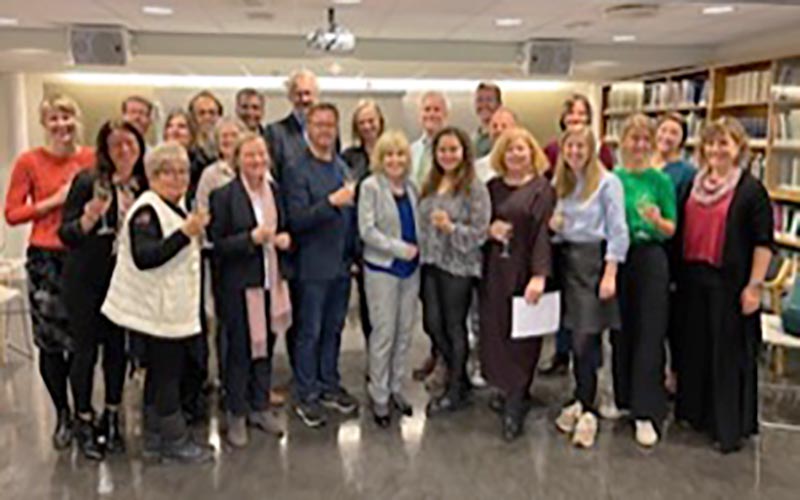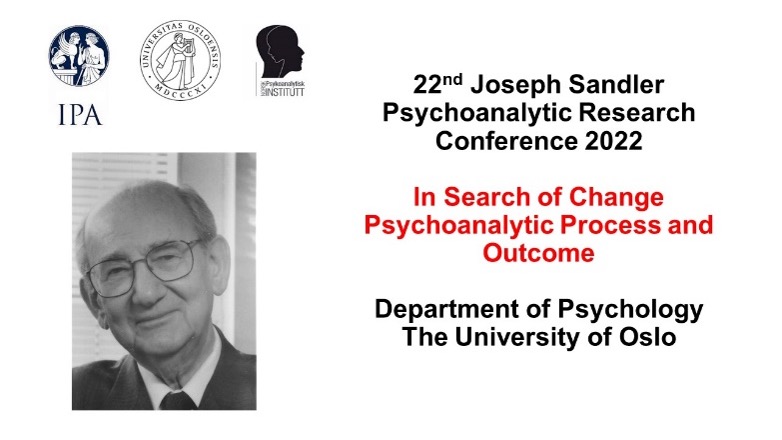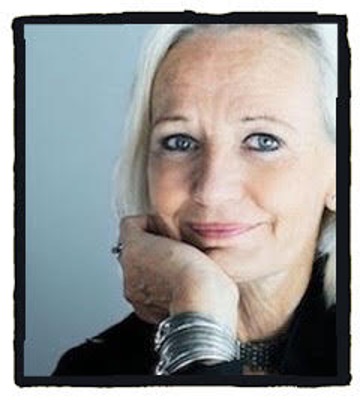December 2022 Committee of the Month
RESEARCH COMMITTEE
Historically, psychoanalysis has had a difficult time promoting research. Although psychoanalysis began by generating an extraordinarily innovative body of knowledge, it grew in isolation from universities and mainly focused on one method of inquiry, namely, the psychoanalytic situation. During the 1990s, something changed, marked by several important events: A Research Committee was established as a permanent committee within IPA; a Research Training Programme (RTP) for promoting psychoanalytic research opened for fellows from all over the world, and the Joseph Sandler Psychoanalytic Research Conference was established. Why should the IPA allocate money for research, and in what way can the IPA benefit from research? These are questions that we in the Research Committee are confronted with from IPA members. Here we explain what we are doing.
 The Research Committee comprises three subcommittees: Research Grants Subcommittee, Sandler/ RTP Subcommittee, and Clinical Research Subcommittee.
The Research Committee comprises three subcommittees: Research Grants Subcommittee, Sandler/ RTP Subcommittee, and Clinical Research Subcommittee.
The Research Grants Sub-Committee
invites applications for research funding on an annual basis. Outstanding proposals are funded following a rigorous evaluation process. In 2022, we received 54 applications from 23 countries and provided $100,000 of funding for a total of eleven major proposals and two "Small Grants" proposals submitted by psychoanalytic candidates. The Research section of the IPA website states that the major requirement for funding is that:
"the research expands psychoanalytic knowledge. Research proposals must be clearly related to psychoanalysis, and all proposals must be accompanied by an explicit statement of how the research contributes to psychoanalytic knowledge."
Expanded psychoanalytic knowledge is perhaps the most important direct benefit to the IPA and psychoanalysis stemming from psychoanalytic research. In addition, the process of inviting, evaluating, and selecting proposals for funding has impacts of its own in stimulating research activity around the world.
To offer some examples, psychoanalytic research projects develop new research methodologies suitable to evaluate the efficacy of psychoanalysis, identify mechanisms of change in treatment, clarify the psychological implications of major life cycle events, study the validity of central psychoanalytic concepts, and evaluate the increasing benefit of change following psychoanalytic treatment. Other benefits of psychoanalytic research include positive impacts on the standing of psychoanalysis in relation to psychology and psychiatry, other mental health treatment areas, academic institutions, journalism, the larger world of scientific research, political institutions, healthcare policy, and philanthropic organisations. Studies of applied psychoanalysis have important implications for allied intellectual disciplines, child development, the relationship of psychoanalysis to social and cultural issues, brain imaging, and other studies in neuroscience and advances in the theory of mind.
To encourage breadth and variety in the proposals submitted to the Research Grants Sub-Committee, we explicitly invite applications in the psychoanalytic domains of outcome research, process research, research relating to mind and brain, research relating to childhood, conceptual research, and research relating to the social world. Recently we have added the domains of research on the effects of COVID-19 on psychoanalytic education and treatment; research on the effects of remote work on processes of psychoanalytic education, supervision, and treatment; and research on methodologies of single case study, intended to generate new psychoanalytic hypotheses or open new areas of study.
By arranging meetings with IPA Board Members and research grant reviewers, the Research Grants Sub-Committee maintains a process of transparency and feedback. Reviewers receive feedback about the results of their work and provide feedback to the sub-committee about the reviewing process itself. Recent innovations in our process are due to reviewers' recommendations. Meeting IPA officers and Board members promotes alignment between the work of the grants sub-committee and the priorities of the IPA.
Here are examples of grants funded in 2022
1. Multi-Level Outcome Study of Psychoanalysis of Chronically Depressed Patients with Early Trauma (MODE). This ambitious project has goals within three domains of psychoanalytic research - outcome, process, and mind and brain. It is a multi-centric study based in Germany, Switzerland, and the US. MODE was initiated by the IPA Board in 2017 to investigate the impact of session frequency on psychoanalytic outcomes systematically. It is a one-year randomised controlled trial with two treatment conditions (high-frequency and low-frequency psychoanalysis), and one group of healthy controls. Outcomes will be assessed using a) clinical-psychoanalytical methods, b) established psychological instruments of psychotherapy research, and c) neurobiological instruments, specifically brain imaging. Its benefits to the IPA will be multiple. In addition to consolidating an important research capability, it is likely to provide evidence of the efficacy of psychoanalytic treatment, demonstrate new methods of studying treatment outcomes, provide data pertaining to the role of session frequency, and offer cross-validation among the three types of outcome evidence (psychoanalytic constructs, widely accepted measures from psychotherapy research, and brain imaging).
2. Lessons from the forced transitions to remote psychotherapy and ways back to the office due to the COVID-19 pandemic. This project, based in Sweden, aims to investigate the short-term experiences, for both patients and therapists, of transitions to, and back from, teletherapy. It will also study the long-term effects of these transitions in relation to patients' personality orientation and attachment style. An additional goal is to clarify which patients - and under which circumstances - benefit more from the customary psychotherapy setting or teletherapy.
3. Therapist Nonverbal Coordination in Psychodynamic Child Psychotherapy: Its Connection to Children's Symbolic Play, Affect Regulation, and Outcome This project, based in the USA and Turkey, will create a Psychotherapist's Nonverbal Coordination Coding system as a practical tool to enhance clinicians' abilities to observe, describe, evaluate, and respond to nonverbal bodily communication within sessions. The authors will develop training in this coding system and promote its dissemination as a research and clinical supervision tool. The creation of this research tool will enhance the evaluation of meaning expressed via the body in child psychotherapy.
These brief summaries of a few selected projects can only offer hints of the multiple benefits to the IPA from funded research.
The next call for applications for research funding will open in March 2023.
The Sandler/ RTP Subcommittee
The Sandler conference is an annual event circulating between Latin America, the United States, and Europe. A specific aim of the conference is to stimulate dialogue between clinicians and researchers and thus bring the field of science (in its diversity, e.g., empirical, conceptual, philosophical, epistemological) closer to the world of clinical work. Many publications and round tables (several are available on YouTube) derive from the Sandler conferences, representing a unique material of high-level debate between psychoanalysis and several fields of research.
 The 22nd Sandler conference, the first to happen in person after the pandemic, took place in Oslo, Norway, in September, hosted by the Norwegian Psychoanalytic Society and the Department of Psychology, University of Oslo. Its theme was In Search of Change: Psychoanalytic Process and Outcome. Speakers came from Latin America, North America, and Europe, most of them psychoanalysts who work both clinically and as professors, playing a leading role in their academic field. The presentations comprised sophisticated outcome research, discussions of change mechanisms in psychoanalytic treatment, conceptual analyses, recent psychoanalytic research in migration and forced exile, and studies of early development, parenting, and mental health. The conference was very well attended (180 people), with much engagement and rich discussions.
The 22nd Sandler conference, the first to happen in person after the pandemic, took place in Oslo, Norway, in September, hosted by the Norwegian Psychoanalytic Society and the Department of Psychology, University of Oslo. Its theme was In Search of Change: Psychoanalytic Process and Outcome. Speakers came from Latin America, North America, and Europe, most of them psychoanalysts who work both clinically and as professors, playing a leading role in their academic field. The presentations comprised sophisticated outcome research, discussions of change mechanisms in psychoanalytic treatment, conceptual analyses, recent psychoanalytic research in migration and forced exile, and studies of early development, parenting, and mental health. The conference was very well attended (180 people), with much engagement and rich discussions.
The primary aim of the Research Training Program (RTP) is to support IPA candidates and young researchers in conceptualising and conducting studies in the broad field of contemporary psychoanalytic research. Research projects of attending fellows get constructive consultation from an international Faculty of IPA Visiting Professors in Psychoanalytic Research. Several projects discussed and mentored in previous RTPs have resulted in published articles and books. The 24th RTP took place in Oslo in September, with 19 fellows from Mexico, Brazil, and Australia as well as from the US and Europe, and with projects ranging from outcome research to psychoanalytic history and tele-analysis.
The Clinical Research Subcommittee
represents an ongoing work on how to 1) best represent psychoanalytic research in the clinical field, enhancing awareness of it within the IPA; 2) encourage a "researcher attitude" in analysts' practice, and 3) support the work of clinical study groups, offering new criteria to assess clinical evidence. Members of this committee also have active roles as faculty members of the RTP, and as speakers and discussants at the Sandler conference.
 Siri Gullestad
Siri Gullestad
Chair, Research Committee, IPA